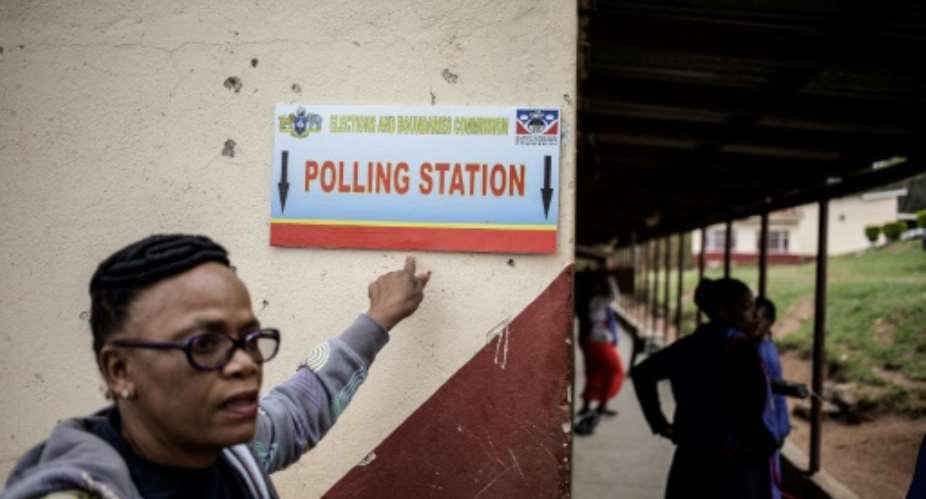The tiny African kingdom of eSwatini, ruled by an absolute monarch, votes on Friday in polls critics describe as a sham but supporters say are a unique blend of tradition and politics.
Political parties are banned from the election, and about 530,000 eligible voters must choose from individual candidates who are almost all loyal to King Mswati III.
The king is one of the world's last absolute rulers -- wielding complete control over the parliament and government, as well as over the judiciary, civil service and security forces.
Mswati, who has 14 wives and more than 25 children, has a reputation for lavish spending on planes and palaces, while 63 percent of his subjects live below the poverty line.
Without warning or consultation, he changed the country's name from Swaziland to eSwatini ("land of the Swazis") in April.
Election campaigning was discreet, with no rallies, no manifestos and just a handful of candidate posters on main road junctions outside the capital Mbabane.
The authorities say that the absence of political parties puts local constituencies at the heart of the vote, and fosters a close link between citizens and elected representatives.
"To the critics, it is important to say that there is no 'one size fits all' democracy or system of government," Pholile Dlamini, deputy chair of the Elections and Boundaries Commission, told AFP.
"This system is a perfect fit because eSwatini is a modern-day country that has chosen to preserve its very rich cultures and traditions."
'Wisest of us all'?
Winners from the 59 constituency ballots will take seats in parliament, along with 10 lawmakers that the king appoints directly.
He can veto legislation, appoints the prime minister and cabinet, and is constitutionally above the law.
 The king is one of the world's last absolute rulers wielding complete control over the parliament and government. By MUJAHID SAFODIEN (AFP/File)
The king is one of the world's last absolute rulers wielding complete control over the parliament and government. By MUJAHID SAFODIEN (AFP/File)
"The election is a farce, of course," said Bheki Makhubu, editor of The Nation monthly magazine, who spent 15 months in jail from 2014 to 2015 for contempt of court after exposing misconduct among judges.
"The king is the executive authority of all things, based on the presumption he is the wisest of us all.
"It is rule by 'divine knowledge' -- not by facts.
"Swazi people either try to win royal attention to seek reward, or they keep their heads down -- but the economy is very depressed and the government is non-functional."
Makhubu said he supported a reformed monarchy rather than a republic, as many Swazis would not accept the authority of an ordinary person.
Street protests
Political parties were banned outright by the king's father in 1973, and still face severe restrictions despite a 2005 constitution that, in theory, guarantees their rights.
The Pudemo party, which was designated a terrorist organisation under draconian new laws in 2008, called for a boycott of the vote, describing it as "fixed" by the king.
Underlying tensions in eSwatini surfaced this week as thousands of protesters joined two days of trade union marches calling for public sector wage increases.
The demonstrations, which centred on the second city Manzini and were broken up by riot police using tear gas and water cannons, left several people injured.
 Voting booths were set up in schools and community halls across the largely rural country a day before the election. By GIANLUIGI GUERCIA (AFP)
Voting booths were set up in schools and community halls across the largely rural country a day before the election. By GIANLUIGI GUERCIA (AFP)
Voting booths were set up in schools and community halls across the largely rural country a day before the election, with results expected over the weekend.
"I want to empower the nation by making the economy more sustainable," Charles Nkhanyeti, 50, who is standing for election, told AFP.
"There are some dissenting voices, but the king has much support. We like the election system and we want to make it work."
The country, landlocked between South Africa and Mozambique, suffers the highest HIV adult prevalence rate in the world at 27.2 percent.
The Southern African Development Community bloc and African Union have deployed observer missions.
But the EU and Commonwealth have not sent teams after issuing reports that criticised democratic deficits in 2013's polls.





 Saglemi Housing Project will not be left to rot – Kojo Oppong Nkrumah
Saglemi Housing Project will not be left to rot – Kojo Oppong Nkrumah
 Transport fares hike: GPRTU issue two-day ultimatum
Transport fares hike: GPRTU issue two-day ultimatum
 ARC endorses Alan as presidential candidate – Buaben Asamoa
ARC endorses Alan as presidential candidate – Buaben Asamoa
 Akufo-Addo appoints Kwasi Agyei as new Controller and Accountant-General
Akufo-Addo appoints Kwasi Agyei as new Controller and Accountant-General
 PNC dismiss reports of mass resignations
PNC dismiss reports of mass resignations
 PAC advocates for revenue collectors to be engaged on commission basis, not full...
PAC advocates for revenue collectors to be engaged on commission basis, not full...
 Genser Energy commissions 110km of natural gas pipeline at Anwomaso
Genser Energy commissions 110km of natural gas pipeline at Anwomaso
 Naa Torshie calls for tolerance, peace ahead of 2024 election
Naa Torshie calls for tolerance, peace ahead of 2024 election
 Asantehene commends Matthew Opoku Prempeh for conceiving GENSER Kumasi Pipeline ...
Asantehene commends Matthew Opoku Prempeh for conceiving GENSER Kumasi Pipeline ...
 Let’s do away with ‘slash and burn politics’ in Ghana — Dr Adutwum
Let’s do away with ‘slash and burn politics’ in Ghana — Dr Adutwum
